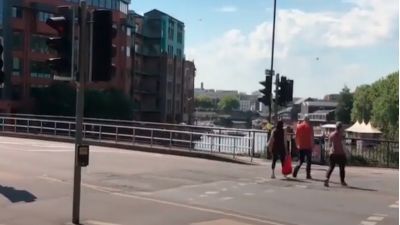Closure of Bristol Bridge to traffic to become permanent from next week

The closure of Bristol Bridge and nearby routes to general traffic will be made permanent next week.
From Saturday 17 July, priority will be permanently given to buses, cyclists and pedestrians. However, motorbikes and taxis will also still be able to use the bridge.
The decision to close the bridge permanently also applies to the camera enforced bus gates at either end of Baldwin Street, on St Augustine’s Parade, and at the bottom of Union Street.
Vehicles, including those used by businesses and residents in the area, disabled bays and car parks using alternative routes. But they will no longer be able to use these streets to pass through the city centre to get elsewhere.
The city council closed the routes last year as part of a trial to improve air quality and make it easier for people to use public transport walk and cycle.
However, the decision proved controversial as in the weeks after it came into force, more than 3,500 people signed a petition for the scheme to be reversed, citing the impact on local businesses. This triggered a counter-petition signed by more than 1,400 supporters of a "car-free healthy city centre".
But speaking today, Mayor Marvin Rees said: “I am delighted to make the change permanent after a successful trial.
"It has removed lots of polluting traffic from the central zone and improved bus punctuality and journey times, without causing significant problems elsewhere on the network.
"By creating more space for public transport, we are paving the way for a mass transit system that will connect us all to jobs, leisure and each other.
"This decision takes us one step closer to a better, more inclusive future with cleaner air, safer and better public transport, and improved walking and cycling routes for everyone.”
Melanie Watson, co-chair of the One City Transport Board added: “Bus passengers consistently tell us that reliable services are one of key improvements they would like to see.
"By providing priority for buses at this key location and removing the congestion on a permanent basis, buses will now be able to travel freely and consistently offer reliable journey times for passengers.
Schemes such as these are vital to encourage passengers back to bus and helps to create a better environment for all.”
An additional six disabled bays have also been installed on High Street and Broad Street as part of pedestrianisation of the Old City, which was also implemented last summer.
Other changes included the pedestrianisation of Cotham Hill and bike lanes on Lewins Mead, Park Row, Upper Maudlin Street and Marlborough Street.
The city council say these measures are in place temporarily for the foreseeable future while permanent schemes are developed.